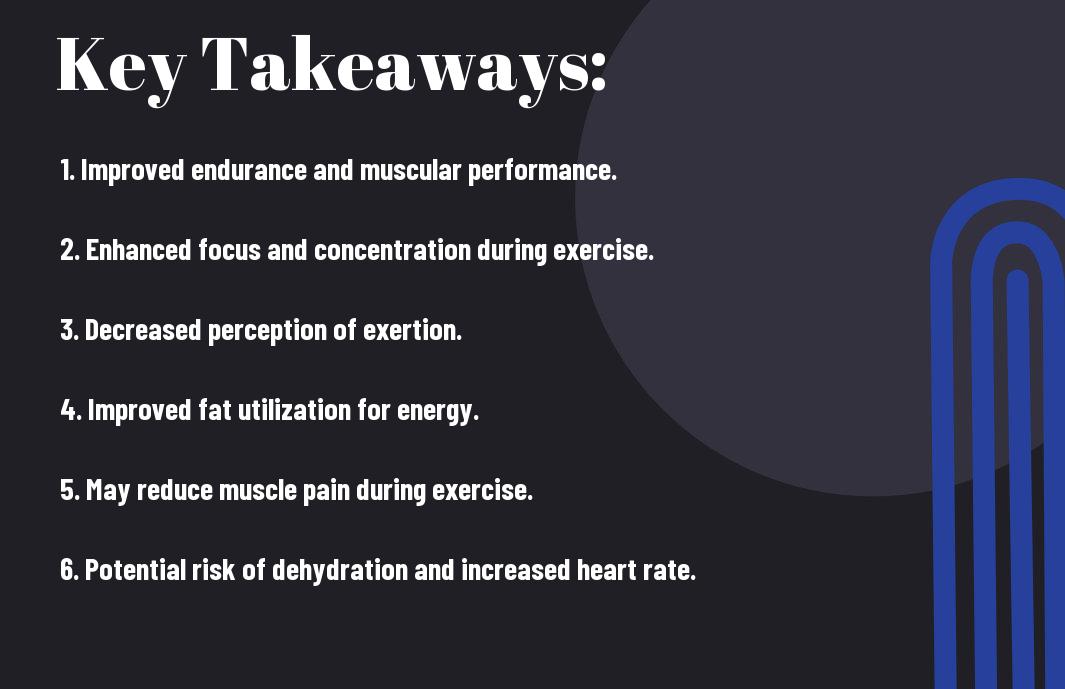Caffeine, a powerful stimulant found in coffee, has been a popular choice among athletes looking to boost their performance. Studies have shown that consuming caffeine before a workout can improve endurance, increase strength, and reduce perceived exertion. But how exactly does this common morning pick-me-up impact athletic performance? Let’s explore into the science behind caffeine and its effects on the body during exercise.
Key Takeaways:
- Caffeine Boost: Coffee can enhance athletic performance due to its caffeine content, which can increase adrenaline levels and promote the release of fatty acids into the bloodstream for fuel.
- Improved Endurance: Consuming coffee before exercise may help improve endurance by delaying fatigue and reducing the perception of effort.
- Enhanced Focus: Caffeine in coffee can improve mental focus and concentration, allowing athletes to stay more alert and focused during their training or competition.
- Speed and Power: Coffee consumption has been linked to improved speed and power during workouts or competitions, making it a popular choice among athletes looking to boost their performance.
- Timing Matters: The timing of coffee consumption is crucial for optimizing its effects on athletic performance, with many recommending consuming it around 30-60 minutes before exercise for maximum benefits.
The Science of Caffeine
How Caffeine Works in the Body
The consumption of caffeine leads to a series of complex reactions within the body that ultimately result in increased mental alertness and physical performance. When you drink coffee, for example, caffeine is absorbed into the bloodstream and reaches peak levels within 30 to 60 minutes.
The Effects of Caffeine on the Nervous System
For athletes, caffeine can have a profound impact on the nervous system. Caffeine blocks adenosine, a neurotransmitter that promotes sleep, thus making you feel more awake and alert. This can improve coordination, reaction time, and overall cognitive function during exercise.
Science suggests that caffeine also stimulates the release of adrenaline, the ‘fight or flight’ hormone, which can increase heart rate and blood flow to muscles. This surge of adrenaline can help athletes push harder and perform better during intense workouts or competitions.


Coffee and Athletic Performance
One of the most popular sources of caffeine for athletes is coffee. The impact of caffeine on athletic performance has been widely studied, with researchers suggesting that it can have significant effects on both endurance and muscle contraction.
The Impact of Caffeine on Endurance
With its ability to stimulate the central nervous system, caffeine has been shown to help improve endurance during physical activities. It does so by increasing the release of adrenaline, which can enhance performance by breaking down body fat for fuel, sparing glycogen stores, and improving muscle endurance.
Caffeine’s Role in Enhancing Muscle Contraction
An additional benefit of caffeine for athletes is its role in enhancing muscle contraction. Caffeine can increase calcium reuptake in the sarcoplasmic reticulum of muscle cells, leading to greater force production and improved muscle performance during exercise.
Muscle contraction is a key component of athletic performance, and the ability of caffeine to enhance this process can result in improved power output and overall physical performance.
The Benefits of Coffee for Athletes
For athletes, coffee can be a game-changer when it comes to enhancing performance. According to Caffeine and sports performance: Pros, cons and …, caffeine in coffee can offer several advantages that can help athletes reach their peak potential.
Increased Alertness and Focus
The consumption of coffee has been linked to increased alertness and focus, which are crucial elements in any athletic performance. With heightened levels of concentration, athletes can make better decisions, react quickly to changing situations, and maintain a high level of performance throughout their training or competition.
Improved Reaction Time and Speed
Improved reaction time and speed are key benefits that coffee can provide to athletes. The stimulating effects of caffeine can help athletes react more swiftly to stimuli, such as starting a race or responding to opponents’ moves. This can give athletes a competitive edge and improve their overall performance on the field or track.
Plus, studies have shown that coffee can aid in increasing the metabolic rate, which can lead to improved physical performance and endurance during prolonged workouts or competitions.
Enhanced Endurance and Stamina
Focus
Increased
The Optimal Amount of Caffeine for Athletes
Once again, caffeine proves to be a valuable tool for athletes looking to enhance their performance. However, the key lies in determining the optimal amount of caffeine to consume to reap the benefits without experiencing negative side effects.
The Recommended Daily Intake
With a recommended daily intake of caffeine for athletes ranging from 3 to 6 mg per kilogram of body weight, it’s imperative to find the right balance. Consuming too little may not yield the desired effects, while consuming too much could lead to jitteriness, increased heart rate, or upset stomach.
Timing is Everything: When to Consume Caffeine
Intake timing can significantly impact the effectiveness of caffeine for athletes. Consuming caffeine 30 to 60 minutes before exercise can enhance endurance, performance, and focus. However, consuming caffeine too close to bedtime can disrupt sleep patterns, which are crucial for recovery and overall athletic performance.
The timing of caffeine consumption can also vary depending on the type of sport or workout. For endurance activities like long-distance running or cycling, athletes may benefit from consuming caffeine before and during the event to sustain energy levels. On the other hand, for short bursts of intense exercise like sprinting or weightlifting, consuming caffeine shortly before the activity may provide a quick energy boost.

Potential Drawbacks of Coffee for Athletes
Dehydration and Electrolyte Imbalance
All athletes must be cautious of the diuretic effects of coffee, which can lead to dehydration if not compensated adequately with water intake. Dehydration can impair athletic performance by reducing blood volume, skin blood flow, sweat rate, and heat dissipation. Additionally, excessive coffee consumption without sufficient water intake can also disrupt the delicate balance of electrolytes in the body, such as sodium and potassium, crucial for muscle function and nerve signaling.
Anxiety and Jitters: The Dark Side of Caffeine
One potential drawback of coffee consumption for athletes is the risk of experiencing anxiety and jitters due to the stimulatory effects of caffeine. While caffeine can enhance focus and alertness, excessive intake can lead to restlessness, nervousness, and even panic attacks. Athletes who are sensitive to caffeine or consume it in large quantities may find themselves experiencing performance anxiety rather than the desired boost in energy.
Drawbacks: It is imperative for athletes to be mindful of their coffee intake and listen to their bodies’ responses. While moderate consumption of coffee can enhance athletic performance, overdoing it can lead to negative side effects that may hinder rather than help performance on the field or in the gym. Finding the right balance is key to leveraging the benefits of coffee for athletic endeavors while avoiding potential drawbacks.
Coffee and Hydration
Despite its popularity as a go-to beverage for boosting energy and performance, coffee is often associated with concerns about dehydration. Many athletes wonder whether their beloved cup of joe could be hindering their hydration levels during exercise. Let’s examine into the relationship between coffee and hydration to better understand how it impacts athletic performance.
The Importance of Staying Hydrated During Exercise
An vital aspect of athletic performance is staying properly hydrated. Dehydration can lead to decreased endurance, muscle cramps, and impaired cognitive function, all of which can significantly impact an athlete’s ability to perform at their best. It’s crucial for athletes to maintain fluid balance before, during, and after exercise to support optimal performance and recovery.
How Caffeine Affects Fluid Balance
The consumption of caffeine, found in coffee and other beverages, has long been believed to have diuretic effects, meaning it increases urine production and could potentially lead to dehydration. However, recent research suggests that the diuretic effect of caffeine is mild, especially in regular consumers who have developed a tolerance to its effects. In moderate amounts, caffeine is unlikely to cause significant dehydration during exercise.
The relationship between caffeine and hydration is complex and varies depending on individual tolerance levels and the amount consumed. While excessive caffeine intake may have a diuretic effect, moderate consumption as part of a well-balanced hydration strategy is unlikely to significantly impact fluid balance during exercise.
Final Words
Taking this into account, it is clear that coffee can have a positive impact on athletic performance due to its ability to enhance endurance, focus, and power. However, it is important to note that the effects of coffee can vary from person to person, and it is necessary to find the right balance to avoid negative side effects such as jitteriness and dehydration. In the final analysis, when consumed in moderation and at the right time, coffee can be a valuable tool for athletes looking to improve their performance.
FAQ
Q: What is the relationship between coffee and athletic performance?
A: Coffee can enhance athletic performance due to its caffeine content, which has been shown to increase endurance, focus, and energy levels during physical activity.
Q: How does caffeine in coffee improve endurance during exercise?
A: Caffeine helps mobilize fatty acids from fat tissues, allowing muscles to use them as an energy source instead of depleting glycogen stores, thus delaying fatigue and improving endurance.
Q: Can coffee consumption impact reaction time and focus in athletes?
A: Yes, caffeine in coffee can improve reaction time, alertness, and focus, which are crucial for athletes looking to optimize their performance during training and competitions.
Q: Is there an optimal time to consume coffee for athletic performance?
A: Consuming coffee 30-60 minutes before exercise is recommended as it allows caffeine levels to peak in the bloodstream, enhancing its effects on endurance, focus, and energy levels.
Q: Are there any potential drawbacks to consuming coffee for athletic performance?
A: Excessive coffee consumption can lead to dehydration, jitteriness, and disrupted sleep patterns, which may hinder athletic performance if not managed properly.
Q: How does coffee compare to other sources of caffeine in enhancing athletic performance?
A: Coffee is a popular and convenient source of caffeine that offers similar performance benefits as other sources like energy drinks and supplements, making it a preferred choice for many athletes.
Q: Can individual tolerance to caffeine impact the effectiveness of coffee on athletic performance?
A: Yes, individual tolerance to caffeine varies, and some athletes may experience greater benefits from coffee consumption than others based on their sensitivity to caffeine and metabolism.
What are the best coffee regions in the world





